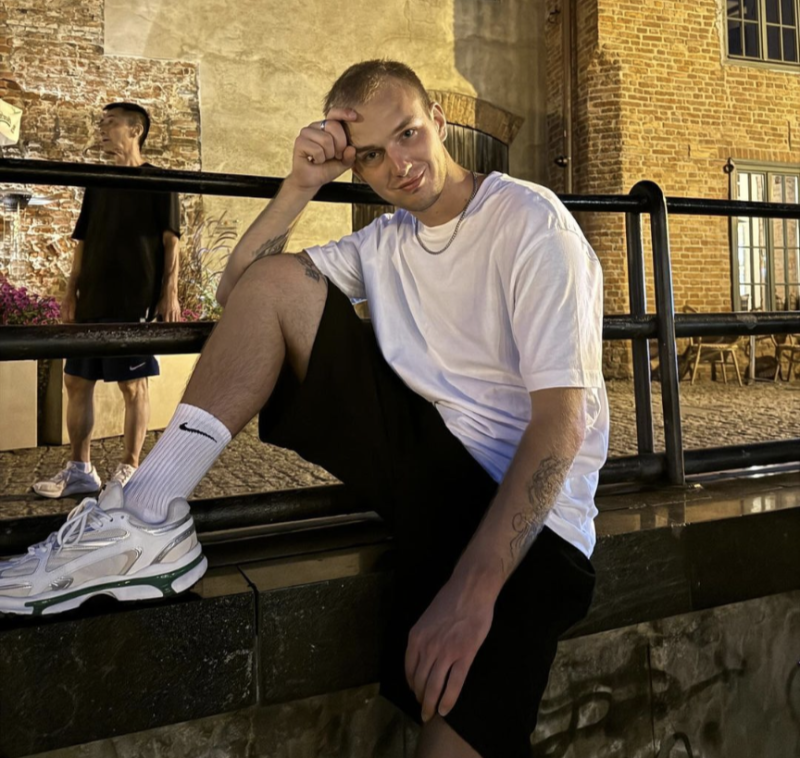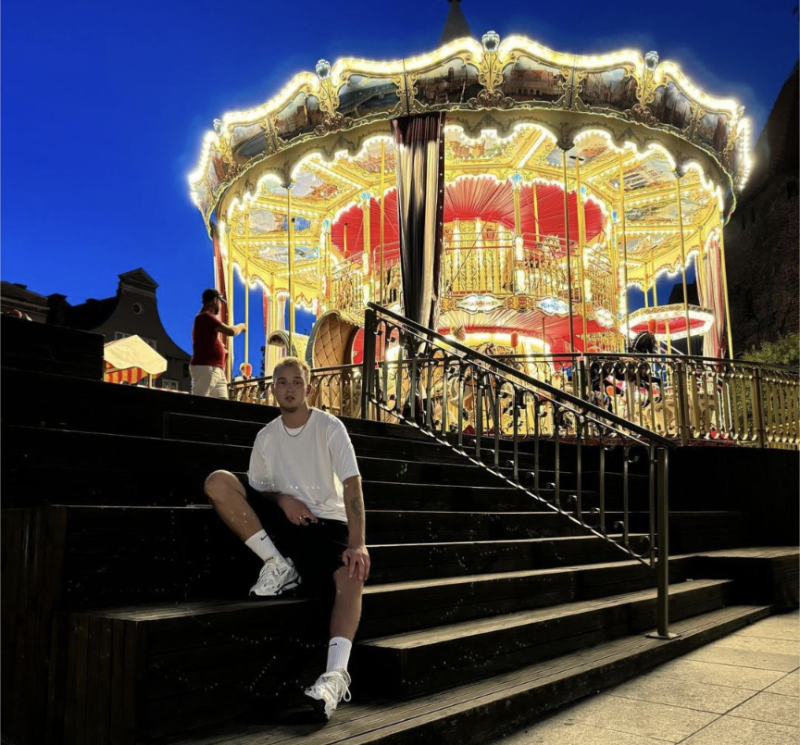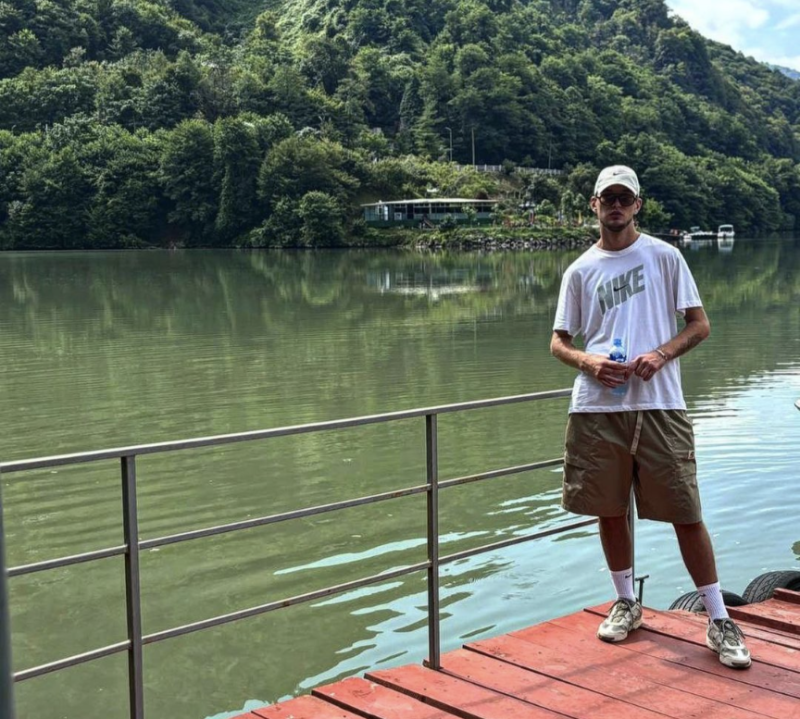"I was shot in the leg at the protests." The story of former political prisoner Dzmitry Panko-Niakrasau
Dzmitry Panko-Niakrasau, a former political prisoner from Brest, was shot in the leg at a protest action in 2020. And a few days later, the Investigative Committee came to him. The man was accused of "mass riots" and sentenced to three years in a penal colony. After fully serving his sentence in the Navapolack penal colony, Dzmitry left Belarus and is now trying to adapt to a new country.
The Brest resident told Viasna how the riot police shot him in the knee, how he expressed his position in the penal colony and ended up in SHIZO for 50 days, and what disappointed him upon release. And also, about getting married in the penal colony.

- Dzmitry Panko-Niakrasau. Photo provided by Dzmitry
"That's it, you're f*cked." The first detention
"The first time they came to me almost immediately after the protest: on August 12, 2020. They broke in, asked for my last name, and said, 'That's it, you're f*cked.' I was beaten a little bit, but not much."
Dzmitry shares how during the search the security forces stole his money and how rude and insulting they were.
"The security forces searched my entire apartment. During the search, they took about 500 rubles for themselves. They asked me: 'Have you been paid for protests?' One of the employees took the money and put it in his purse."
Later, at the police department, Dzmitry asked if they would give him his money back. Policeman Drazdou was surprised: "What do you mean? What money?" The interlocutor asked no more questions for his own safety.
"You will get eight years"
At the police department, Dzmitry was severely intimidated and pressured to confess to what he had not done. The police threatened to imprison him for eight years. The interrogation lasted four hours, but the security forces did not achieve anything. At that time, they had nothing on Dzmitry.
I was shot in the leg at the protests
The interlocutor says that at the protest on the night of August 10–11, 2020, he was shot in the knee from the back.
"Through the hole, I saw bone and tendons. The bullet hit the bone and got out. In hospital, I had to give my data and report everything as it was. And I told them that I was shot by riot police."
Dzmitry believes that because of the personal data that he left in the hospital, the security forces came to him.
The man was detained for the second time on August 23 of the same year. In the morning, the Investigative Committee came to his home.
"I told them right at the entrance that my grandmother was at home and that there should be no ruckus. They were young guys who reacted with understanding.
I found out in the Investigative Committee that a criminal case had been initiated against me for 'mass riots' (Part 2 of Article 293 of the Criminal Code). After the detention, I was sent to a pre-trial detention centre for three days. My leg started to fester there. The wound was still fresh. I asked for medical help or to be taken to a hospital. But no one helped.
After my release, I immediately went to the hospital to treat my leg. The doctor removed the recently applied sutures, and a lot of pus came out of the wound. It's a good thing they only sentenced me to three days, otherwise my leg would have been much worse."
"Planned to escape to the territory of Ukraine"
For almost a year, Dzmitry was free on his own recognizance, awaiting trial. He was offered to leave the country. But the man did not want to expose his relatives.
"During the trial, on July 19, 2021, I and several other people were taken into custody. GUBOPiK (Main Directorate for Combating Organized Crime and Corruption) had information that we were planning to escape to the territory of Ukraine. On August 12, 2021, I was sentenced to three years in a penal colony and, after an appeal, sent to penal colony No. 1," the source says.

- Dzmitry Panko-Niakrasau. Photo provided by Dzmitry
"Showing your position is life-threatening"
The prison administrations punishes mainly the most feisty ones, those who disagree openly, says Dzmitry.
"Showing your position in a penal colony is life-threatening. But people can still tell other's worth and the reason why they are doing time."
Prisoners working for the administration of the penal colony regularly inform on political prisoners. They deliberately provoke political prisoners with aggressive conversations. Dzmitry says that this is already considered the norm in penal colonies. Political prisoners just try to avoid such conversations.
"Convicts working for cops can insult political prisoners. They often say something harsh and provocative on political topics. For example, 'Your West is f*cking shit.' Or, 'Russia will defeat everyone, and Ukraine will be f*cked.' Although everyone is forbidden to talk about such topics in the penal colony. If you hear all this all the time, you can barely restrain yourself from saying something in response," the former political prisoner shares.
Dzmitry was sent to a punitive isolation cell (SHIZO) because he was provoked to have a political conversation.
"One day there was a conversation about the war. I spoke out in support of Ukraine in front of other prisoners. I was immediately turned in to the cops and put to SHIZO for 10 days for the second time.
I learned about the war when I was in the industrial zone. Someone came into the workshop and said, 'The war has begun.' All the decent guys I knew supported Ukraine. Everyone was trying to get at least some information, trying to find out the truthful details from the pro-government news. But it's very difficult there."
I wanted to preserve my humanity. 50 days in SHIZO
Dzmitry was put in SHIZO three times. The first and second times for 10 days. For the third time, the man spent there 30 days in a row.
"I was in SHIZO for the third time in August. It's +30 degrees outside, and there's nothing to breathe inside at all. You're constantly sweaty. The robe that I received was all dirty and smelly. I washed my robe in the sink and immediately put it on wet, so that there would be no complaints that I was naked in the cell. But they wrote a report against me for this and extended the days in SHIZO. According to the rules, you can not take off your clothes and wash them. But according to the regulations, we must be given clean clothes and have them changed once a week. During the three weeks that I spent in SHIZO, no one replaced anything.
I didn't care about the extra days. I wanted to be in decent conditions and preserve my humanity. But the administration doesn't give a fuck who you are, what you are, and how you feel."

- Dzmitry Panko-Niakrasau. Photo provided by Dzmitry
"I asked for a sick leave, but they just smiled." Industrial zone and treatment
According to numerous stories of former political prisoners, political prisoners in the penal colony are often forced to perform difficult types of work in very poor conditions: overworking, lack of special equipment, humiliation from the administration, etc. In such conditions, health deteriorates quickly and prisoners are released with numerous illnesses.
Dzmitry says that he repeatedly turned to the prison doctor, but in response received only painkillers without any diagnosis and proper treatment.
"One day we were loading construction debris for a long time and a nerve got pinched in my back or something like that. That was the only time I got an injection. But that was all their treatment. I asked them for a sick leave, but they just smiled and sent me back to work."
According to the source, the prisoners in the penal colony worked six days a week. But even on their only day off — Sunday — the political prisoners were forced to unload construction debris for several hours.
For two years, the man did hard jobs: he cleaned wires and was a handyman. It was only in the autumn of 2023 that he was transferred to a sewing workshop, which was an easier job.
"Even if you have serious illnesses, it is very difficult to switch to an easier job. First, you need to beg for a long time, negotiate. In addition, you need to send medical documents from the outside.
Once my hands were frostbitten very badly. Now I have problems with my circulatory system. In winter, your hands almost turn black there."
Dzmitry says that the sewing workshop is clean and there is heating in winter. And there is also no harmful waste from burning plastic wire loom.
"Once I was invited to the sewing workshop to help unload something. I asked to sew on a machine. They saw that I was doing well and asked the head of the colony himself to transfer me there. You could say I was lucky. But I had been asking for a transfer for about six months." says Dzmitry.
The interlocutor says that he mainly sewed construction workwear for the Russian companies Sirius and Soyuzspetsodezhda.
"When she saw my hands, she almost cried." Wedding in the penal colony
In May 2022, Dzmitry got married in the penal colony. Several more couples got married at the same time. Dzmitry says that he only wrote an application in the penal colony, and his future wife collected all the other documents outside. According to the regulations, young couples are provided with a long-term meeting. But the former head of the Navapolack penal colony, Andrei Palchyk, in response to Dzmitry's request, only said: "What a request! You're f*cking kidding me."
"That morning, I purposely put on not the robe, but cleaner clothes that people wear in the residential area. When my wife saw my swollen hands, she almost cried. I couldn't even fit the ring on my finger. That's because my hands were frostbitten.
We were taken to a special room. A solemn speech was read out there, we signed the papers, and that was it. The whole procedure took only a few minutes. We just hugged briefly. I didn't even want to say anything there. There was an opportunity to take a photo, but I refused because I didn't want to leave any memory of that moment."
The young man was released with numerous illnesses due to poor conditions and hard harmful work in the penal colony. Now he is raising money for treatment and adaptation.
"I didn't feel any euphoria after the release. The only joy was to see my family and friends. When I arrived in my native Brest, I did not have the feeling that this was my city. Everything was alien.
I was very disappointed that nothing had changed during my imprisonment. The people were so terrorized that no one said anything out loud. Everyone just complained about bad jobs and expensive studies."
As a result, Dzmitry left Belarus and is now recovering his health and adapting to a new place.

















